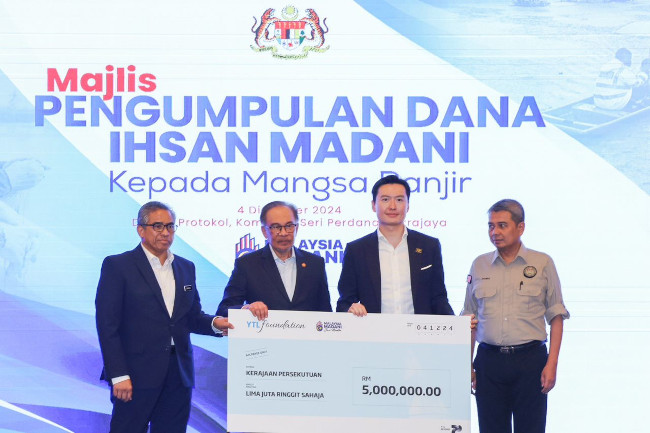RM35.8 Million In Corporate Donations Flow In For Flood Victims - PM Anwar Bernama, December 4, 2024 The government has received donations totalling RM35.8 million from 23 private companies and corporate bodies to assist flood victims across the country. This came following the call made by Prime Minister Datuk Seri Anwar Ibrahim last Monday for the private sector to lend a helping hand to the people affected by the northeast monsoon floods, either through financial contributions or by sending aid machinery to the flood-hit areas. Speaking at the presentation ceremony of Ihsan MADANI Donations at the Seri Perdana Complex today, Anwar said that all the donations will be coordinated by the Implementation Coordination Unit (ICU) of the Prime Minister's Department. “I have asked the ICU to list the infrastructure needs in addition to what has been allocated by the government,” he said. The donations received include RM5 million each from YTL Corporation Bhd and Yayasan Albukhary, RM3 million each from Sapura Secured Technologies and U Mobile Sdn Bhd, while Mah Sing Group Bhd, WCT Bhd, IJM Corporation Bhd, Kuala Lumpur Kepong Bhd, Berjaya Corporation Bhd, and Press Metal Bhd each donated RM2 million. Westports Malaysia Sdn Bhd, Roadcare (M) Sdn Bhd, Sunway Bhd, Malaysia Resources Corporation Bhd, and The Weststar Group each contributed RM1 million, while Fortress Mining Sdn Bhd, Selia Selenggara Selatan Sdn Bhd, Johawaki Holdings Sdn Bhd, and Datuk Lawrence Lim Swee Lin (personal contribution) donated RM500,000. Donations were also received from Newsfields Land Sdn Bhd (RM250,000), AHAM Asset Management Bhd (RM250,000), the Association of Malaysian Vehicle Importers and Traders (PEKEMA) (RM200,000), and YHA Travel & Tours (M) Sdn Bhd (RM100,000). The Prime Minister said that the donations would also be used to repair school buildings and toilets, as many schools have been used as temporary relief centres (PPS). Nevertheless, Anwar emphasised the importance of better coordination between the government and nongovernmental organisations (NGOs) to ensure that aid reaches those in need and that existing resources are used effectively. “...I think it’s better for us to distribute the aid, not necessarily to government departments, but also to NGOs that know the real situation and the needs on the ground. If we just do it on our own, we might end up helping those who have already received assistance. That’s why we need to coordinate more efficiently,” he said. |